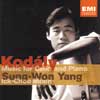Kodaly Complete Cello & Piano Works
A début recital that shows technical brilliance and expressive boldness
View record and artist detailsRecord and Artist Details
Composer or Director: Zoltán Kodály
Genre:
Chamber
Label: Début
Magazine Review Date: 2/2003
Media Format: CD or Download
Media Runtime: 67
Mastering:
Stereo
DDD
Catalogue Number: 5 75685-2

Tracks:
| Composition | Artist Credit |
|---|---|
| Sonata for Solo Cello |
Zoltán Kodály, Composer
Sung-Won Yang, Cello Zoltán Kodály, Composer |
| Sonata for Cello and Piano |
Zoltán Kodály, Composer
Ick-Choo Moon, Piano Sung-Won Yang, Cello Zoltán Kodály, Composer |
| Sonatina |
Zoltán Kodály, Composer
Ick-Choo Moon, Piano Sung-Won Yang, Cello Zoltán Kodály, Composer |
| Adagio |
Zoltán Kodály, Composer
Ick-Choo Moon, Piano Sung-Won Yang, Cello Zoltán Kodály, Composer |
Author: DuncanDruce
This CD is issued as part of EMI’s Debut series, a fact more subtly alluded to on the cover than with previous examples I’ve seen. And indeed these two Korean artists are quite clearly seasoned performers, approaching their interpretive task with the sort of confidence and certainty that only comes from considerable experience.
Sung-Won Yang, who studied in Paris and in the US, produces a notably rich, expressive tone, ideal for the Solo Sonata’s extensive explorations of the lower register – the opening of the Adagio sounds magnificently dark and resonant. It’s obvious that he and Ick-Choo Moon feel a strong affinity with Kodály (Yang contributes a perceptive note to the booklet), and perform his long, arching melodies with a fine sense of line and of rising and falling tension. And they have no trouble in finding just the right Hungarian idiom, whether for the florid rhetorical outbursts that open the Solo Sonata and (on the piano) the Sonatina, or for the dance styles that predominate in the finales of both sonatas.
The whole programme is indeed very finely and sympathetically played, but the major achievement has to be the Solo Sonata. It takes a player of Sung-Won Yang’s technical brilliance and expressive boldness to make one feel the work’s full grandeur. ‘One of the greatest masterpieces’, asserts Yang. As you listen, you’re inclined to agree.
Sung-Won Yang, who studied in Paris and in the US, produces a notably rich, expressive tone, ideal for the Solo Sonata’s extensive explorations of the lower register – the opening of the Adagio sounds magnificently dark and resonant. It’s obvious that he and Ick-Choo Moon feel a strong affinity with Kodály (Yang contributes a perceptive note to the booklet), and perform his long, arching melodies with a fine sense of line and of rising and falling tension. And they have no trouble in finding just the right Hungarian idiom, whether for the florid rhetorical outbursts that open the Solo Sonata and (on the piano) the Sonatina, or for the dance styles that predominate in the finales of both sonatas.
The whole programme is indeed very finely and sympathetically played, but the major achievement has to be the Solo Sonata. It takes a player of Sung-Won Yang’s technical brilliance and expressive boldness to make one feel the work’s full grandeur. ‘One of the greatest masterpieces’, asserts Yang. As you listen, you’re inclined to agree.
Discover the world's largest classical music catalogue with Presto Music.

Gramophone Digital Club
- Digital Edition
- Digital Archive
- Reviews Database
- Full website access
From £8.75 / month
Subscribe
Gramophone Full Club
- Print Edition
- Digital Edition
- Digital Archive
- Reviews Database
- Full website access
From £11.00 / month
Subscribe
If you are a library, university or other organisation that would be interested in an institutional subscription to Gramophone please click here for further information.




